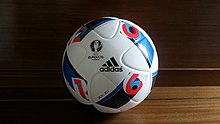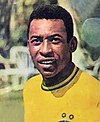| ||
|---|---|---|
|
Brazil professional footballer Eponyms and public art Films
Media
Family Related
|
||
The beautiful game (Portuguese: o jogo bonito) is a nickname for association football. It was popularised by Brazilian footballer Pelé, who played from 1957 to 1977. It was a term widely used in Brazil, though some think the exact origin of the phrase is disputed. Stuart Hall, an English football commentator, used it in 1958. Hall admired Peter Doherty when he went to see Manchester City play at Maine Road and used the term the beautiful game to describe football as a whole. During his career, the Brazilian footballer Ronaldinho was an exponent of the jogo bonito ('beautiful game') style of play. Although made famous around the world, the phrase jogo bonito in Brazil has been replaced with futebol-arte ("Art Football") which means the same.
Etymology
The exact origins of the term are disputed. The origin has been attributed to Brazilian footballer Waldyr "Didi" Pereira, and the presenter Stuart Hall claimed to have originated it in 1958. The English author and football fanatic H. E. Bates used the term earlier, including in a 1952 newspaper piece extolling the virtues of the game entitled "Brains in the Feet". Earlier writers used the term in 1848 to describe the game of baaga'adowe, a forerunner of lacrosse as played by Ojibwe at Vauxhall Gardens in London, and to tennis in 1890.
Usage

Brazilian footballer Pelé is credited with making the phrase synonymous with football. In 1977, he named his autobiography My Life and the Beautiful Game. The book's dedication reads: "I dedicate this book to all the people who have made this great game the Beautiful Game." The phrase has entered the language as a description for football.
"The Beautiful Game" is the title of a 1996 album. Featuring football anthems such as "Three Lions", music writer John Harris states that the album captures how the build-up to UEFA Euro 1996 "caught the imagination of the UK's musicians." It is also referenced in the title of Andrew Lloyd Webber's 2000 musical The Beautiful Game. It is used as a title for the 13-part 2002 series charting the history of the game: History of Football: The Beautiful Game, narrated by the actor Terence Stamp.
The song "Wavin' Flag"—rapper K'naan's Coca-Cola promotional anthem for the 2010 World Cup in South Africa—contained the lyric "let's rejoice in the Beautiful Game". In January 2014, New Model Army released a song called "The Beautiful Game" in support of the project Spirit of Football. A football podcast was released with the title The Beautiful Game.
Terms used

Sportswear company Nike has referenced the beautiful game in its football commercials. In 1996, a Nike commercial titled "Good vs Evil" was a gladiatorial game set in a Roman amphitheatre where ten football players from around the world, including Eric Cantona, Ronaldo, Paolo Maldini, Luís Figo, Patrick Kluivert, Ian Wright, and Jorge Campos, defend "the beautiful game" against a team of demonic warriors, which culminates in Cantona receiving the ball from Ronaldo, pulling up his shirt collar, and delivering the final line, "Au revoir", before striking the ball and destroying evil.
Nike uses the Portuguese phrase joga bonito—meaning "play beautifully" and not "beautiful game", which would be jogo bonito—as one of its slogans for football products. Nike began using the slogan joga bonito in a campaign preceding the 2006 FIFA World Cup in an attempt to curb players' behaviours on the pitch. In collaboration with and promoted by former international footballer Eric Cantona, Nike released a series of adverts to promote a game that is skillful and dignified, not riddled with theatrics and poor sportsmanship. Sportswear company Adidas also named an official match ball of UEFA Euro 2016 Adidas Beau Jeu, which translates to "The Beautiful Game" in English.
See also
References
- Harper, Nick (2 May 2003). "Stuart Hall". The Guardian. London. Archived from the original on 2 April 2019. Retrieved 24 April 2011.
The player I fell in love with and who inspired me to coin the phrase 'the beautiful game' was Peter Doherty, an inside forward, my first hero.
- "Ronaldinho's Biography".
- ^ Moore, Brian (15 July 2010). "South Africa World Cup besmirched 'beautiful' game". The Daily Telegraph. London. Archived from the original on 25 October 2010. Retrieved 18 May 2012.
- Hall, S; Mayo, S: The Daily Mayo, 6 May 2009, BBC Radio 5 Live
- Bates, H. E. (16 November 1952). "The Sunday Times". p. 4. Archived from the original on 3 March 2016. Retrieved 30 April 2012.
- Catlin, George (1848). Notes of eight year's travels and residence in Europe... p. 119. Archived from the original on 28 May 2022. Retrieved 19 January 2022.
- Heathcote, John Moyer; Edward Oliver Pleydell-Bouverie; Arthur Campbell Ainger (1890). Tennis. p. 10. Archived from the original on 28 May 2022. Retrieved 19 January 2022.
- ^ "Pelé's journey from street urchin to soccer's greatest star hits the big screen". Fox News. Archived from the original on 8 August 2021. Retrieved 31 May 2017.
- "The World Cup will show why football is still a beautiful game". The Telegraph. No. 12 June 2014. Archived from the original on 24 July 2021.
- Pelé; Robert L. Fish; Shep Messing (2007). My Life and the Beautiful Game: The Autobiography of Pelé. Skyhorse Publishing Company, Incorporated. p. v. ISBN 978-1-60239-196-3. Archived from the original on 28 May 2022. Retrieved 19 January 2022.
- The Last Party: Britpop, Blair and the Demise of English Rock, John Harris (2003), p. 302
- Brown, David (2004). "God and Enchantment of Place: Reclaiming Human Experience". p. 398. Oxford University Press
- "Rapper K'Naan's Wavin' Flag in World Cup triumph". BBC. 18 June 2010. Archived from the original on 13 April 2019. Retrieved 17 October 2018.
- "New Model Army's "Beautiful Game" « The Ball 2014". Theball.tv. Archived from the original on 8 August 2021. Retrieved 28 May 2014.
- "The Beautiful Game". The Beautiful Game. Archived from the original on 22 February 2014. Retrieved 28 May 2014 – via The Internet Archive.
- Jackson, Steven J. (10 November 2004). Sport, Culture and Advertising: Identities, Commodities and the Politics of Representation. Routledge. p. 186. ISBN 978-0-415-33992-6.
- Antony Young (2007). "Profitable Marketing Communications: A Guide to Marketing Return on Investment". p. 138. Kogan Page Publishers,
- Steve Hatch, Jim Taylor (2009). "Rigorous Magic: Communication Ideas and their Application". John Wiley & Sons,
- Kane, Pat (18 July 2006). "Let football eat itself". The Guardian. Archived from the original on 4 November 2020. Retrieved 22 September 2014.
- "Euro 2016: Adidas unveil 'Beau Jeu', the tournament's official match ball" Archived 13 September 2017 at the Wayback Machine. The Independent. Retrieved 30 May 2017
Further reading
- Gregg Bocketti, The Invention of the Beautiful Game: Football and the Making of Modern Brazil (Gainesville: UP of Florida, 2016)
| Pelé | |||||||||
|---|---|---|---|---|---|---|---|---|---|
| Football career |  | ||||||||
| Eponym | |||||||||
| Media |
| ||||||||
| Related people |
| ||||||||
| Related topics | |||||||||
| Association football | |||||||
|---|---|---|---|---|---|---|---|
| Chronology |
|  | |||||
| Rules |
| ||||||
| Equipment | |||||||
| Variants of the game | |||||||
| Positions | |||||||
| Strategy | |||||||
| Skills | |||||||
| Terminology | |||||||
| Memorabilia | |||||||
| Organised supporters | |||||||
| Comparisons | |||||||
| Main associations | |||||||
| Olympic | |||||||
| Lists |
| ||||||
| Related topics | |||||||
